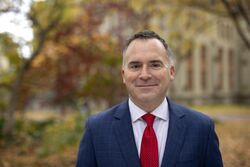Biography:Michael Weisberg
Michael Weisberg | |
|---|---|
 | |
| Born | October 20, 1976 |
| Nationality | American |
| Education | University of California, San Diego Stanford University |
Notable work | Simulation and Similarity: Using Models to Understand the World (2013) |
| Institutions | University of Pennsylvania |
| Thesis | When less is more: Tradeoffs and idealization in model-building (2003) |
| Doctoral advisor | Peter Godfrey-Smith |
Main interests | Philosophy of science |
Michael Craig Weisberg (born October 20, 1976) is an American philosopher of science, currently Bess W. Heyman President's Distinguished Professor and Chair of Philosophy at the University of Pennsylvania, where he also serves as Interim Director of Perry World House, directs the Galápagos Education and Research Alliance, and is a Non-resident Senior Advisor for the International Peace Institute.
Education and career
Weisberg earned both a B.S. in chemistry and a B.A. in philosophy in 1999 from the University of California, San Diego,[1] where he studied with Philip Kitcher. He earned his Ph.D. in philosophy in 2003 at Stanford University under the supervision of Peter Godfrey-Smith.[1] He has taught at the University of Pennsylvania since 2003.
Weisberg is the editor-in-chief of the peer-reviewed journal Biology and Philosophy.[2]
Philosophical work
Weisberg is known for his research in philosophy of science, especially the relationship between idealization and the use of models in biology and chemistry, as well as his work in social ecology and global climate policy.[3] He has also studied public understanding of science.[4]
References
- ↑ 1.0 1.1 "Department of Philosophy". https://philosophy.sas.upenn.edu/sites/default/files/MWCV-Sept18.pdf.
- ↑ "Michael Weisberg". https://philosophy.sas.upenn.edu/people/michael-weisberg.
- ↑ "Michael Weisberg" (in en). https://philosophy.sas.upenn.edu/people/michael-weisberg.
- ↑ "Bill Nye and Ken Ham Debated Creationism—But Did They Change Anyone's Mind?". 2014-02-05. https://news.nationalgeographic.com/news/2014/02/140205-creationism-debate-bill-nye-ken-ham-opinion/.
External links
- Personal faculty website
- Michael Weisberg publications indexed by Google Scholar
 |

